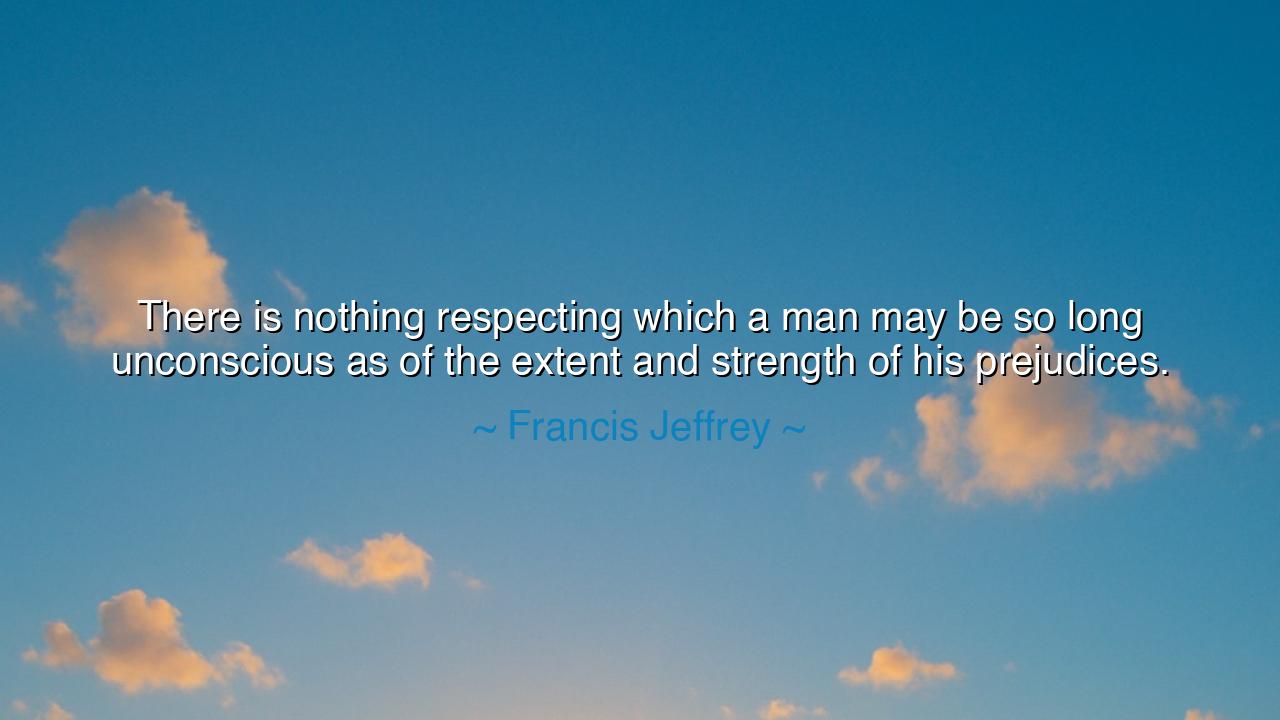
There is nothing respecting which a man may be so long
There is nothing respecting which a man may be so long unconscious as of the extent and strength of his prejudices.






Hearken, O children of the ages yet unborn, and lend your hearts to the wisdom of Francis Jeffrey, a scribe of human nature, who speaks of a shadow that dwells within all men—the prejudice that blinds the soul. He warns that there is scarce a force so powerful and yet so hidden; a man may walk through life, believing himself impartial, while the roots of bias and preconception entwine silently around his thoughts, his judgments, and his deeds. Such prejudices are the unseen chains that bind reason, often unknown even to the mind that wields them.
The origin of Jeffrey’s insight lies in the reflective age of the Enlightenment, when reason was exalted and men sought to master knowledge and morality. Yet Jeffrey perceives that even amidst the light of learning, the human heart harbors shadows. Prejudice, he shows, is not merely a matter of ignorance, but of the subtle accumulation of assumptions, shaped by custom, upbringing, and society. A man may proclaim virtue and justice, yet remain enslaved by unseen biases, unaware of the extent and strength of these internal chains.
Consider the arena of history, where Jeffrey’s warning is starkly visible. The trial of Galileo Galilei offers a vivid example: learned men, guided by the rigid doctrines of their time, were so steeped in preconception that they could not see the truth of the heavens. Their prejudices blinded them to evidence, even when reason and observation stood before their eyes. It is a testament to the power of unseen bias: a mind may possess knowledge and intellect, yet still be constrained by invisible shackles.
Jeffrey’s words carry both caution and revelation. The strength of prejudice is greatest when it is unconscious, for a man may think himself discerning while acting in accordance with deep-seated partialities. These biases shape judgments in subtle ways, guiding decisions in commerce, governance, and the social sphere. Only through deliberate self-examination and confrontation of one’s assumptions can the mind glimpse the vast reach of these hidden forces and begin to free itself.
In the moral realm, too, this truth endures. Consider the abolitionists who sought to end slavery in the 19th century. Many citizens, convinced of their own justice and virtue, were blind to the prejudices that upheld oppressive institutions. It was only through sustained reflection, exposure to new perspectives, and engagement with the suffering of others that minds could awaken to the hidden strength of their own biases. Jeffrey’s insight is thus a call to vigilance: the recognition of one’s prejudices is the first step toward moral clarity.
The emotional depth of his wisdom lies in the humility it demands. To confront the extent of one’s prejudices is to confront the self: to admit that even our noblest convictions may be guided by invisible chains. Yet this confrontation is not a curse but a path to freedom. The mind, once aware of its hidden forces, can act with discernment, tempered by reflection, and engage with the world not as a slave to assumption, but as a participant in truth.
Therefore, O seeker of understanding, let Jeffrey’s teaching guide your life. Examine your thoughts, question your assumptions, and seek the counsel of those whose perspectives differ from your own. Reflect upon the judgments you make, the passions you follow, and the convictions you hold, with a mind aware that prejudice may lurk in the shadows. By doing so, you cultivate clarity, wisdom, and moral courage, tempering the raw strength of your mind with the humility of insight.
Finally, let this lesson endure through time: no man is entirely free from prejudice, yet the measure of his greatness lies in the willingness to perceive it. Strength resides not only in knowledge or skill, but in the courage to confront the unseen chains within the heart. To awaken to the extent and power of one’s biases is to claim a higher form of liberty, to walk the path of reason and justice, and to act in harmony with truth, as Francis Jeffrey, sage of the human spirit, has so solemnly warned.






AAdministratorAdministrator
Welcome, honored guests. Please leave a comment, we will respond soon